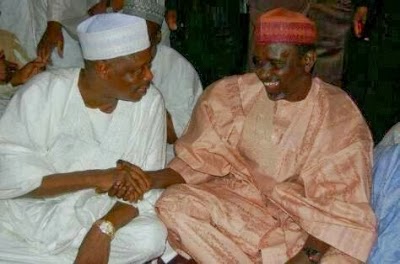Muhammad Muhsin Ibrahim
@muhsin234
The political atmosphere in Nigeria, particularly in my state, Kano, is, with each passing second, becoming more tense and intense. Although I presently reside outside the state, one cannot help but see and hear this and that on air and online. I am not a politician, nor into politics; I had thought I was a very passive partisan, but even that was a long time ago. I am thankful to Allah that I have successfully quit, and wish to reserve any serious public commentary. Nonetheless, given things as they are, I couldn’t resist the temptation to break my earlier ‘promise’ not to comment. I believe my motive was well-generated. For, we need relative sanity in the polity, peace in our state and mutual respect among the populace, which are all that the current state of affairs sets out to disperse and replace with impurity, impudicity and perfidy.
The incumbent governor of Kano state, Engr. Rabi’u Musa Kwankwaso and his predecessor, Malam Ibrahim Shekarau, have been at the forefront of Kano politics for almost a decade and a half, since Nigeria’s return to democracy in 1999. No two politicians have had a more significant impact on the lives of any citizens or residents of Kano between the ages of 30 and 35 than these two gentlemen. However, the sway varies widely. While it’s positive for some, it’s detrimental for many others. Loyalty or otherwise to these pilots of Kano politics has turned multitude foes to friends, friends to foes; brothers to enemies, enemies to brothers; etc. Why? Where is the wisdom, the education, the maturity, and all that the Kano people are known for?
Politics, as the saying goes, is a dirty game. I often add that it is also murky water in Nigeria, which, entering and passing through unsoiled and unspoiled, is a near-impossible task. But people do not get any option; they will have to. Leaders cannot elect themselves and mount the mantle of power just like that. They have to be chosen by the electorates; hence, the people must be there. Another challenge, the bigger one, is that there is always an array of candidates to be chosen from. This presents a far greater test for the voting public, for, in this context, there are still edible, uneatable and thorny fruits to pick from. It’s often the case that the excellent aspirant is deserted and the bad and the ugly ones are elected, sometimes at even a landslide, due to the latter’s ‘failure’ to spray money or to tell people the usual inventory of sugar-coated promises. In a nutshell, the involvement of people, innocent or otherwise, is inescapable in politics both as contestants and voters.
Both Kwankwaso and Shekarau, irrespective of the party each belongs to, now or later, deserve commendation from an average Kano resident. A party is just an abstract entity. You may argue that one has done better for Kano, but you cannot deny that the other has done something for the state, and neither has performed to a T, for they are human beings. Let’s not demonise one and sanctify the other. In my view, loving both is not incompatible. They are not, definitely, the polar axis as we are made to believe. I, however, respect all views, for after all, it is in our psyche to be subjective. Again, politics is all a matter of opinion, choice and preference. That is why politics is the one particular endeavour where fair-mindedness and judgment are hardly called to action. Selfish-interest, aggrandisement, beclouded thought and blind love are what, in most, if not all, cases lead.
Therefore, my call to my dear, fellow Kano people is to try and bury the hatred, sheathe the sword and call (back) our God-given sophistication to action. I know neither of them would be happy with the way things are unfolding. I have recently read somebody on Facebook claiming that he was severely assaulted by his neighbour because he supported one of them. There are other cases of clashes, abuses, and other forms of unwanted confrontations that happen every now and then in Kano in the name of defending or supporting one of them. This was unsurprising to me, for it almost happened to me years ago. A very close friend of mine shunned me for some days, but later, following my unilateral decision to face him, we reached a shaky truce. My crime, as I learnt from our conversation, was merely criticising his dearest political mentor. This is tantamount to making them—Kwankwaso and Shekarau—villains. But are they?
I am not professing purest neutrality, but at least we should not let the egos, aspirations and achievements or failures of some leaders dictate our undertakings, control our minds and later destroy our collective thinking and life. We had better learn to respect our natural individual differences. I don’t know of any monolithic society. Therefore, each and every one of us would not, for he could not, support one politician and leave the camp of the other just because that’s what suits his friend, brother or neighbour. No matter whether he is a saint or devilish politician, he must have followers, sometimes strong ones, and you cannot stop that. Some millions of others practice a different religion from yours. What do you do to them? You cannot prevent the sun from rising tomorrow, so you cannot, no matter how hard you try, stop everyone from adhering to what they believe in. It will be abominably unjust to judge people by their choice. We are distinctive. It’s wisely said: to each his own.

Comments
Post a Comment